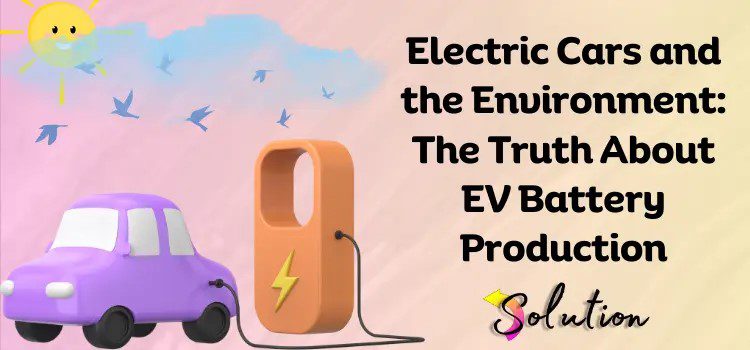
Electric vehicles (EVs) are hailed as a cleaner alternative to gas-powered cars, but there’s growing concern over how their batteries are made. Is EV battery production truly sustainable? What’s the environmental cost? In this post, we’ll uncover the truth about EV battery production, breaking down the facts behind the headlines.
What Is EV Battery Production?
EV batteries—primarily lithium-ion—are the heart of an electric vehicle. They rely on key raw materials like lithium, cobalt, nickel, and graphite. The production process involves:
-
Mining raw materials
-
Processing and refining
-
Manufacturing battery cells
-
Assembly into battery packs
Each stage has environmental and ethical implications, leading to debates about whether EVs are as green as they seem.
The Environmental Impact of EV Battery Production
1. Mining and Resource Extraction
-
Lithium and cobalt mining can cause deforestation, water depletion, and pollution, particularly in South America and Africa.
-
Human rights concerns persist, especially around child labor in cobalt mining in the Democratic Republic of Congo.
2. Energy-Intensive Manufacturing
-
Battery production requires significant energy, often sourced from fossil fuels—especially in countries like China.
-
This contributes to CO2 emissions during the production phase, which may temporarily offset EVs’ carbon savings.
Comparing EVs and Gasoline Vehicles
While EV battery production has a higher initial environmental footprint, studies show that EVs still produce fewer emissions over their lifetime compared to internal combustion engine (ICE) vehicles.
✅ Key Fact: According to the International Council on Clean Transportation, EVs emit 50–70% less CO₂ over their lifetime than gasoline vehicles.
The Push for Sustainable Battery Production
Thankfully, the EV industry is evolving. Efforts to reduce the environmental impact of battery production include:
-
Recycling initiatives: Companies like Redwood Materials and Li-Cycle are scaling battery recycling to recover lithium, cobalt, and nickel.
-
Ethical sourcing: Automakers are investing in traceable supply chains and conflict-free mining.
-
Green manufacturing: Gigafactories powered by renewable energy are helping to cut carbon emissions.
What the Future Holds
As technology improves, expect solid-state batteries, alternative chemistries, and recycled materials to make EV batteries cleaner and more efficient. Legislation in regions like the EU is also pushing for battery passports and sustainability benchmarks.
Conclusion
EV battery production isn’t perfect—but it’s improving fast. While mining and manufacturing pose environmental challenges, the long-term benefits of switching to electric vehicles outweigh the drawbacks, especially as innovation and regulation drive cleaner practices.
Understanding the truth about EV battery production is key to making informed decisions in a rapidly evolving transportation landscape.
SEO Keywords Used:
-
EV battery production
-
electric vehicle batteries
-
lithium mining
-
sustainable EVs
-
battery recycling
-
EV environmental impact
-
electric vehicle sustainability
Would you like a version tailored for a specific audience (e.g., investors, eco-conscious consumers, engineers)? Or should I help format it into a WordPress-friendly format or HTML?





